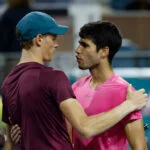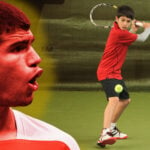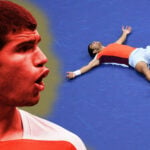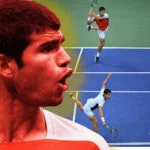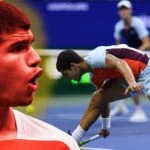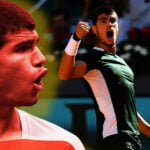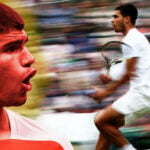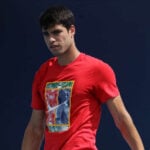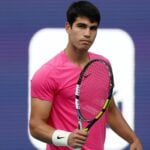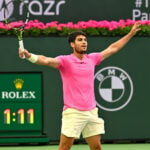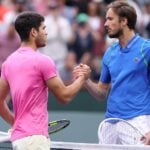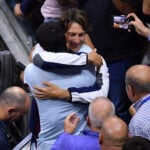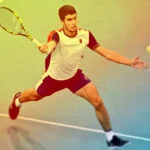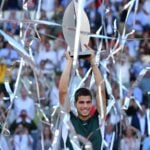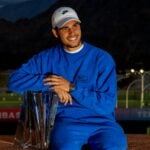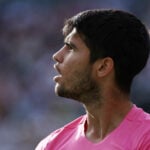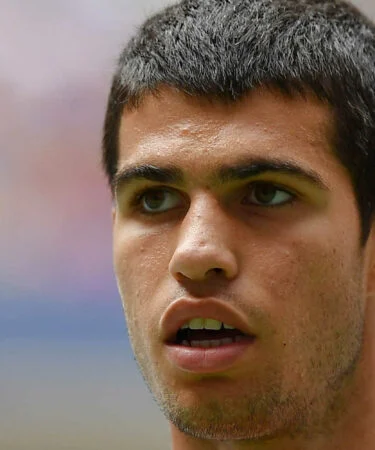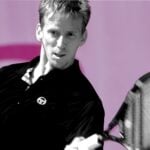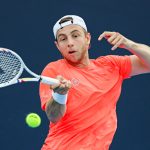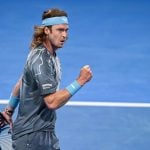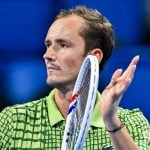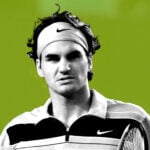Exclusive interview with Alcaraz’s coach Juan Carlos Ferrero: “Carlos and I are almost the same person, we think the same way”
Speaking exclusively to Tennis Majors during the Miami Open, Juan Carlos Ferrero, the man behind Carlos Alcaraz’s meteoric rise to the top of men’s tennis, reveals all the details you could want to know about their common journey
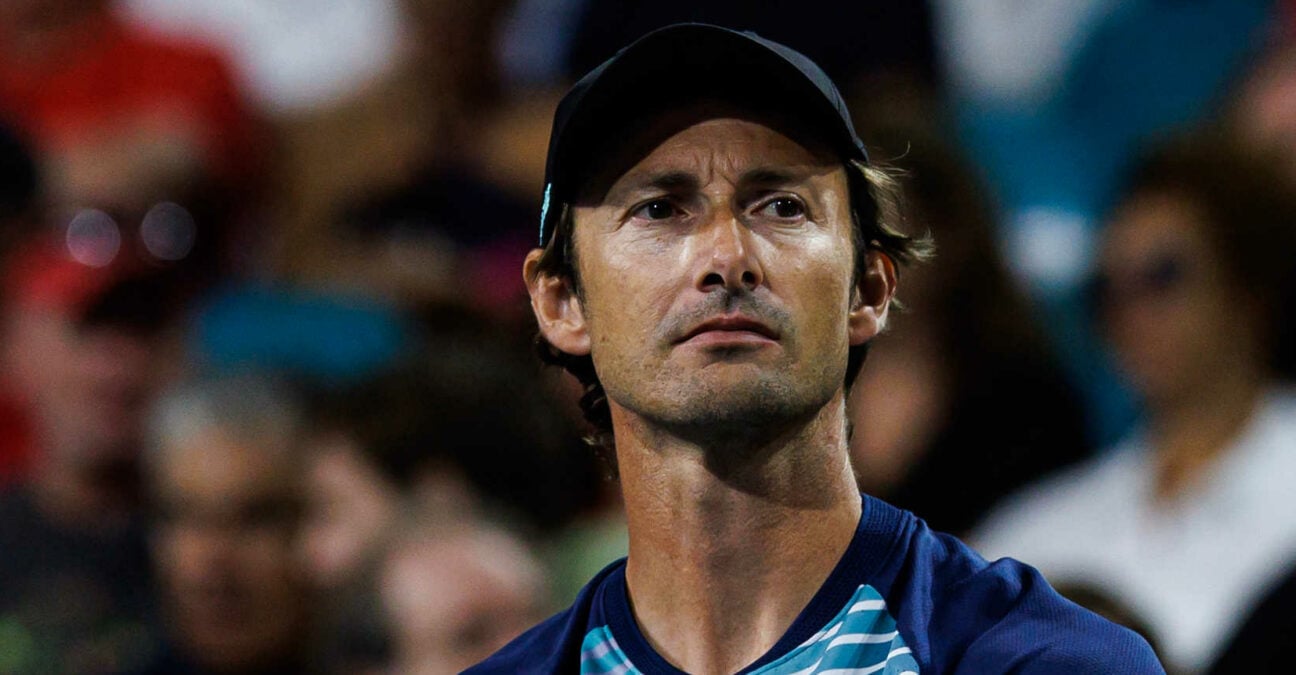 Juan Carlos Ferrero, Miami 2023 | © Mike Frey for Tennis Majors
Juan Carlos Ferrero, Miami 2023 | © Mike Frey for Tennis Majors
When this website decided to do a deep dive into Carlos Alcaraz’s rise to the top in a six-episode series, released at the end of 2022, several times we thought: ‘Wouldn’t it be great to have coach Juan Carlos Ferrero‘s insights in the series?’ Now that Alcaraz is back at No 1 and playing lights-out tennis during the Sunshine Double (he won Indian Wells and lost in semis in Miami), the former world No 1 said yes to Tennis Majors, and gave even more of his time than was scheduled – we let him go just as his time on court with Alcaraz and the rest of the team was commencing. Lucky us! And lucky you… We’re pretty confident you’ll learn a lot about the dynamic teenager who has been shaking the foundations of men’s tennis for more than a year now. A player who ‘thinks super big’, says Ferrero…
People initially knew you as a tennis player and a champion, who won Roland-Garros in 2003 and was No 1 at the rankings. Now that you are a coach, at the highest level, with Carlos Alcaraz, how do you rate this experience?
Juan Carlos Ferrero: When you’re playing you don’t think about being a coach in the future. The first thing people have to know is that I own an academy (in Alicante, Spain). That was maybe the way for me to prepare the next step after my retirement. Being the driver of this academy, seeing the players there, giving them tips was probably a way to start being involved in coaching. The first period of my coaching career was with Alexander Zverev (six months in 2017-2018). It was nice, it was a way for me to come back on the Tour after five years without coaching anyone. It was a great experience and then it made me think I should be involved in a more difficult experience, that would be coaching and preparing a very talented young boy that everybody expected to be good. That was a nice goal, I could prepare my knowledge as a coach with these experiences.
After you retired as a player, how did you feed your reflection of the tennis, on the game’s evolution, and how fast the game moved?
Juan Carlos Ferrero: It’s a day by day work. You see it, you feel it, even more if you’re living it. Right now I feel there are too many people “destroying” the game, not building the point. They hit, hit, hit, as fast as you can, to finish the point. At the same time, I wanted to build Carlos in another way, we are trying to do as good as we can in that purpose.
When we see Carlos Alcaraz play, we feel that you had a clear vision of where to bring his tennis to be some steps ahead of the others. Do you agree?
Juan Carlos Ferrero: I don’t know. Let’s say that the first thing I saw was Carlos’ game and how he could be adapted. It’s very difficult to find a player to whom you can tell to play in very different ways, and then he does it. Example: to beat Daniil Medvedev in the Indian Wells final, we made a plan, and this plan was not normally a plan Carlos has all the time. It was kind of similar, but not same. Carlos was able to execute it and prevail. One of the greatest things I remember about him happened when he was 15, when he practised with players that were much better than him, like Dominic Thiem in Rio de Janeiro. He adapted his speed to Thiem’s speed, which was much faster than he normally hit. I felt before it was one of his assets, but then you could see it. Very few can do that.
What’s impressive with Carlos' game identity is that he creates a lot of uncertainty, because he can do so many things. You know Federer’s patterns. You know Nadal’s patterns. You know Djokovic’s patterns. Honestly, you can’t really say that with Carlos.
Juan Carlos Ferrero: I agree with that. It’s so good to have that and it can also be so bad, because it’s a trap. When he was younger, he used all his options but not in the right order. It was a mix. At this time, I could say something very precise to Carlos but I had no idea about what would happen next on the court. It’s difficult to play with the right order when you have these tools. Being more mature now, more experienced, it seems that he put it together.
Is this job about bringing clarity in his game done or is it still processing?
Juan Carlos Ferrero: Still working, really. He’s 19. He’s playing at the top level but obviously he’s not 100 percent. A tennis player has to improve things all his life and Carlos has to be able to do that for his career.
This game identity, did you define it together?
Juan Carlos Ferrero: Let’s say that when you coach a player, you have to adapt your ideas to his game. That’s what I did. He played very “inside the court” when I met him, willing to go to the net very often. He had a powerful forehand when he was 15 already, and good hands; so it was easy for me to understand what he needed for the future. He also understands tennis like that, so that was very easy.
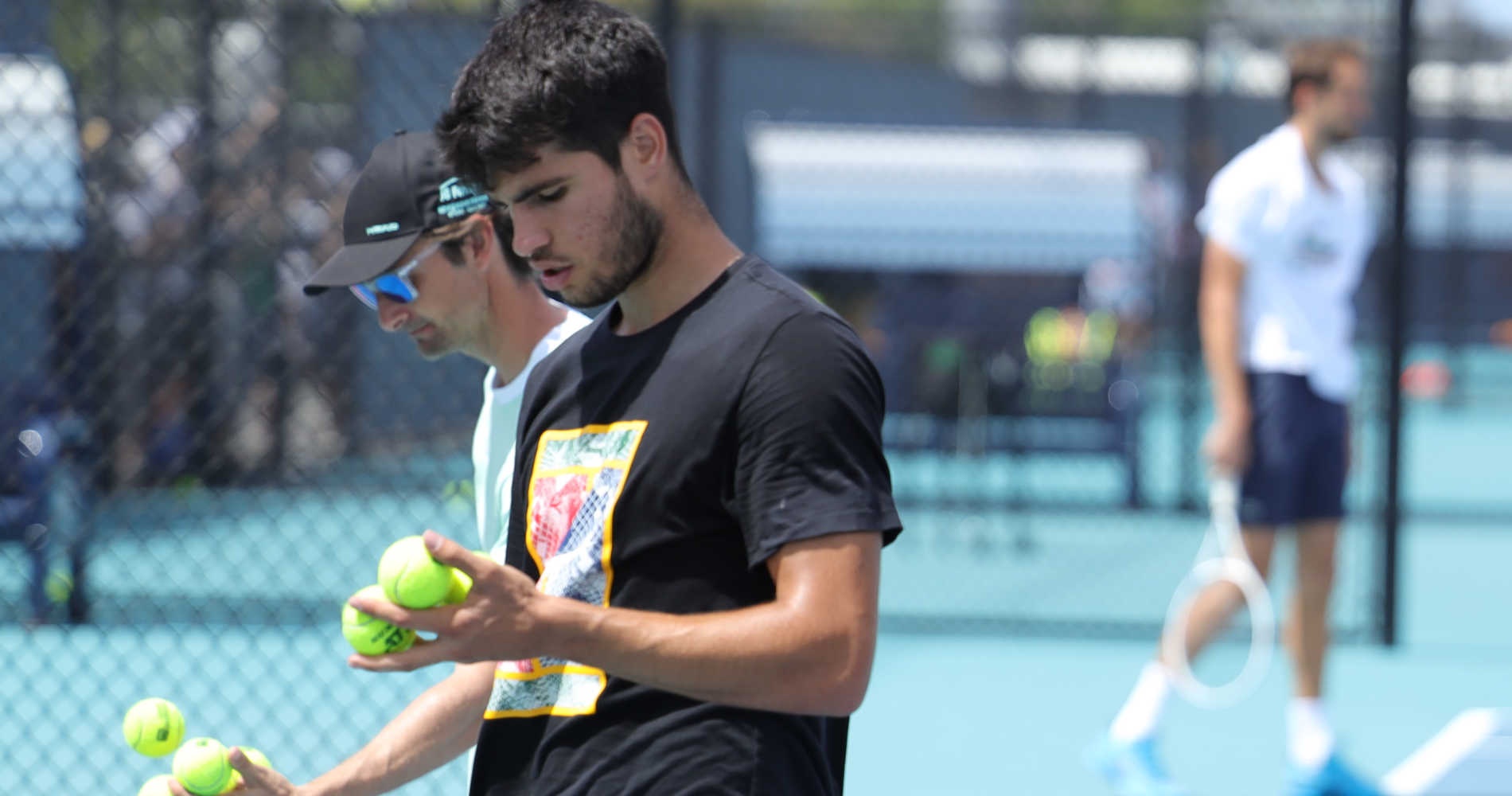
When you hear, and people talk, that he is a mix between the three players from the Big Three, what are your thoughts?
Juan Carlos Ferrero: I don’t like to compare him to the others and…
(Interruption) That’s not the point of the question. The question is: can we assume that he is, at 19, a synthesis of what Federer, Nadal and Djokovic brought to tennis? He grew up seeing them play and he was allowed to think that it was possible to do what they did…
Juan Carlos Ferrero: You can say that you need to take the best examples available to add things to your game, absolutely. Federer’s movement, Nadal’s mentality and so on. We do try to take details from players when we think they are super good, to add them to our game. But you know, Carlos had to hear in the past that he was the new Nadal, etc… It was super heavy on his back. In a sense we were so proud, yes, that people think that, but it was not easy for him and me to hear that all the time. The only thing I can tell you is that he thinks super big. He does think super big. A lot of journalists ask me if he can win 22 Grand Slams. I don’t know. What I know is that he is able to do big things for tennis. Let him play and try. If he wins the second, we’ll ask him when will be the third. It will be a great pressure all the time. So can he do like the others did? I don’t know.
Please recall the first time you saw him play.
Juan Carlos Ferrero: He was 12 or 13 when I saw him for the first time. He was playing at my academy, a tournament we have there. People were talking about him already. You know: “There’s a guy playing differently in these categories, etc.” So I went to see him compete. He was so skinny, he had no strength at all, but you could already see the drop shots, how he loved going to the net, he even played some chip-and-charge on the returns. He wasn’t a classic 12 or 13-year-old player.
What about his competitiveness?
Juan Carlos Ferrero: At 12, 13, it’s very difficult to say if someone is good at competing. You can say one has something special on the court but not that one can compete at the highest level in the future. You’ll still find people telling you: ‘I knew he or she would be great when he or she was 10’, but it’s very difficult to say.
How did you happen to become his coach?
Juan Carlos Ferrero: It was a big decision to take. It was the opposite of what I lived with Zverev in the past. It wasn’t anymore a life of private jets and high standard hotels. I talked to my wife and my family. His family is a tennis family because his father was a pro, it helped me to get it. One thing that helped is that he lived one hour from my home. And his manager, Albert Molina, is a guy I know for a long time. I have a very good relationship with him. To build a project from the beginning was something important for me. The family said OK.
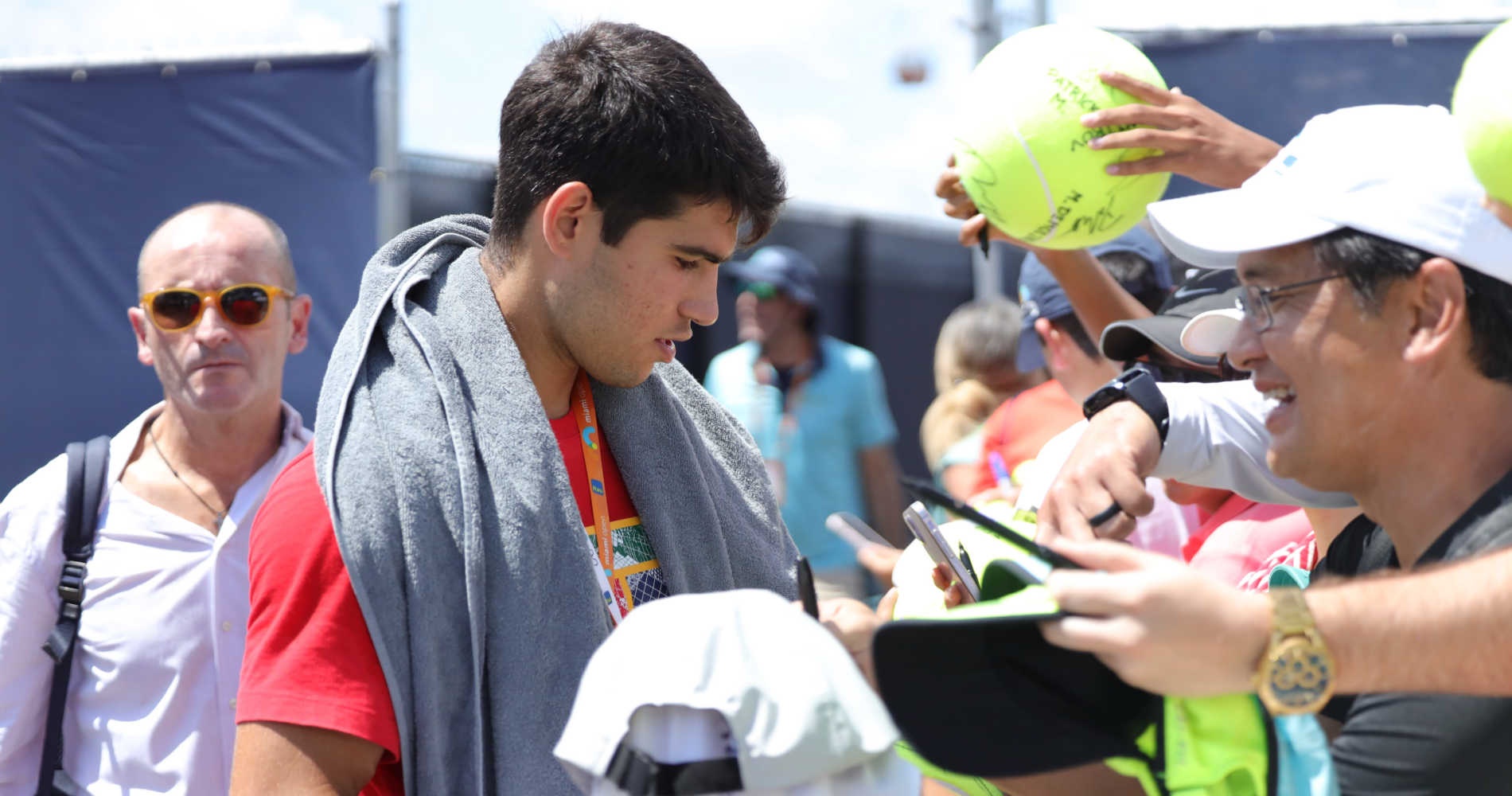
“A big decision to take”: I understand they asked you to become his coach, it was not you that suggested that?
Juan Carlos Ferrero: I had a proposal from the manager. He came, asked if the project could work for me because he knew that it was something different from Sascha. You could see that Carlos played really good but you knew you had to build up everything, build a team, prepare a family, etc. The most important, from that point was that we built an amazing team around him.
Why did they ask you?
Juan Carlos Ferrero: I don’t know, you have to ask Albert (laughs). Albert knows I am a very strict person. Hard work is the only way that I know. He thought that Carlos needed something like this, someone to put order in his path. He knew Carlos had an incredible talent but that they needed to build something to make him grow as a person and of course as a player.
Between his 12 and his 15, how close and how far were you from Carlos Alcaraz?
Juan Carlos Ferrero: I was far, I was far… He was on his U12 and U13 we have in Spain, I was in my academy. Everybody was still talking about him. The second match I saw was when he was 14. At that time I had already left Sascha. There was no plan on the table but Albert had already told me: ‘come and see the project’. Albert had his own plan to make things happen (smile).
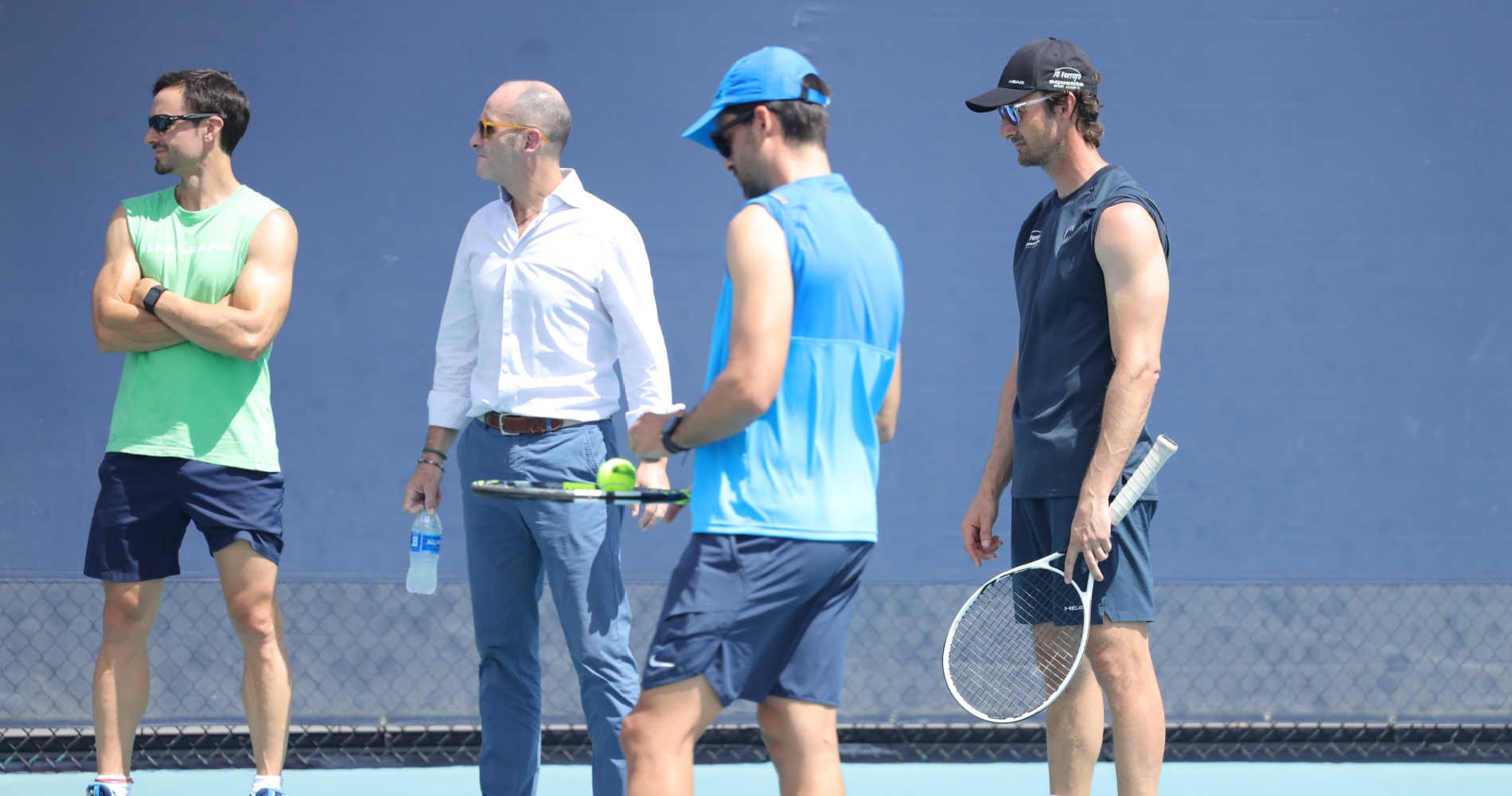
What’s the team around Carlos?
Juan Carlos Ferrero: The physical trainer and the physiotherapist are from my academy. Juanjo Moreno and Alberto Lledo. You have also Alejandro Garcia in Murcia. Albert Molina is the manager. The psychologist is Isabel Balaguer. Juanjo Martinez is the doctor. The people from my academy were involved at the same moment as me. The other people were there even before.
When you said yes, what was the goal ? Like: “being a pro,” or “become the greatest?”
Juan Carlos Ferrero: There wasn’t a goal. Nobody told me he was to be ‘like that’. People knew he had talent, me also, and the plan was just to work and build the player. My goal was to make him No 1 in an undetermined period of time, but we had nothing in mind that would happen so quickly. It went faster than I thought. When you see him practice all day, it doesn’t surprise you that much, because you see his level on a daily basis. But it remains surprising that it went super fast at each stage: Futures, Challengers, ATP 250 etc… It’s very difficult to succeed so fast, even if you’re super special.
Every time he reaches a new milestone, he reacts quickly to reach the next stage. How do you explain that?
Juan Carlos Ferrero: It’s very difficult to explain. Some people are super special and that’s it. Roger, Rafa, Novak… How do you explain that they won 22 Grand Slams? They are special is the answer.
Yes but that’s the point of the question: Roger needed four years to become Federer, between his first steps as a legit pro and his first Wimbledon…
Juan Carlos Ferrero: Yes but Rafa didn’t and they have the same level now. I don’t know the words: maybe you’re born with that. It comes out from people like them and it just happens.
What type of coach would you say you are?
Juan Carlos Ferrero: I like to talk a lot with the players about how we have to do things, generally, and on the court, of course. I ask the player what he thinks. I’m not the type of coach, like [who says] ‘You do that and you apply without discussions’. We debate everything, even if I know the path we have to walk on for the future. Let’s say I’m strict on the ideas that I have. But I’m a close person, generally friendly with people. I try to learn something from any coach I’m discussing with. So I’m that open with the players.
Some coaches pretend that the relationship with the player is the key part of the job. Patrick Mouratoglou says he’s mainly good at “connecting with the player and knowing what he/she thinks before he says a word”. Gilles Cervara says that the tennis is “the easy part of the job, everybody can do it”.
Juan Carlos Ferrero: I do agree. The connection with the player is very important. Coaching has to be bigger than hitting balls, bring towels, making drills. You have to talk about absolutely everything with your player. If you talk only about tennis you make a burnout don’t you? Our relation(ship), Carlos and I, is 100 percent like that.
Do you remember the moment when you felt you had Alcaraz’s full trust? How long did it take?
Juan Carlos Ferrero: (Reflecting) It’s something we built from the beginning. The connection was unbelievable since the start. But maybe the answer is: one year after we started. I needed to see him react in good moments and bad moments. It’s a bit of everything, but from the day we were connected 100 percent to now, we are almost the same person. We think the same way on the court. I don’t need to say too much to get him understanding me. And the opposite is true. One look and we know what each other is thinking. That’s really great.
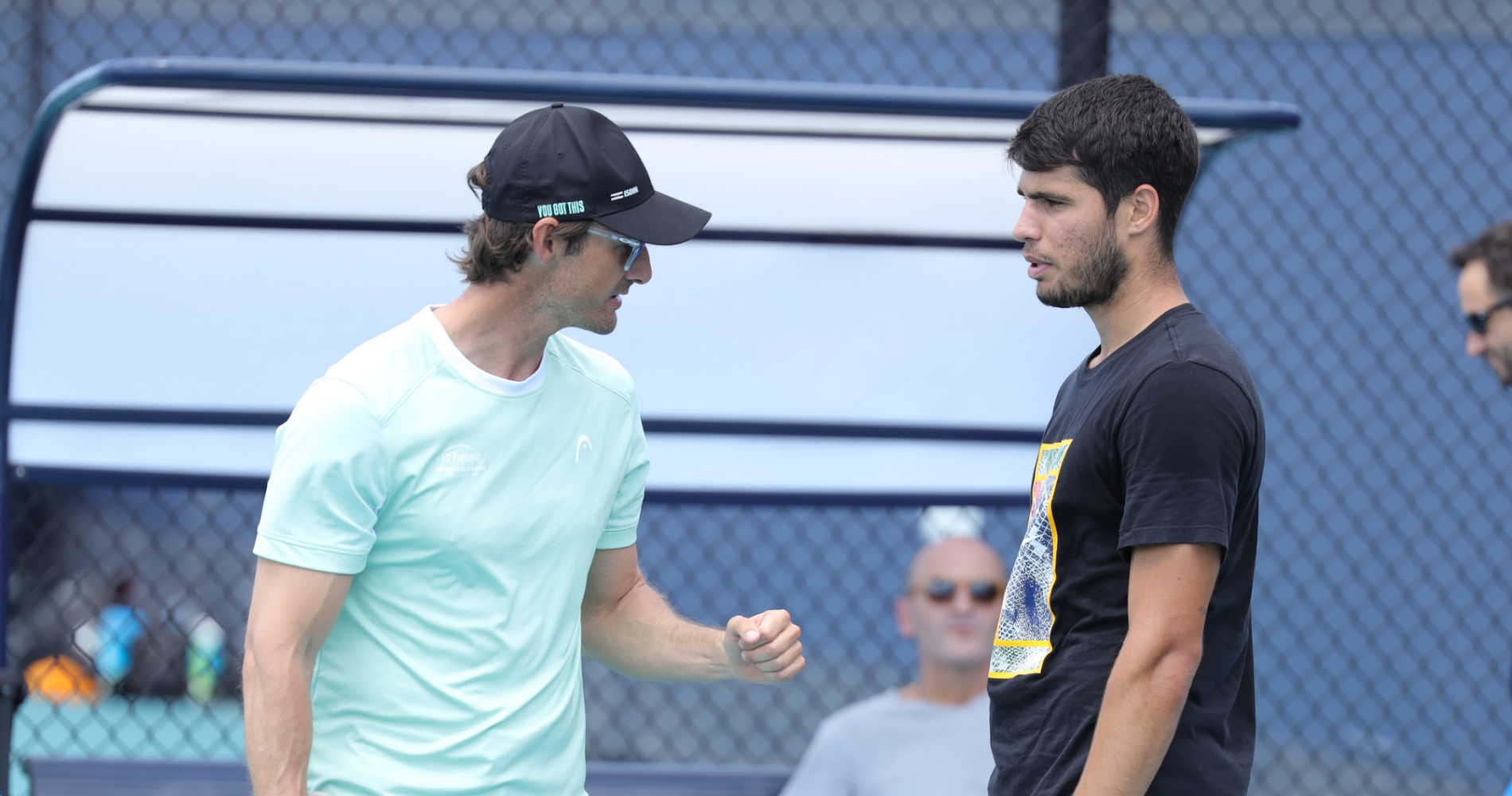
When you happen to disagree on an option, how does it work?
Juan Carlos Ferrero: He has his own character, a strong one. To be a good player, it’s a must-have anyway. One thing that he has genuinely is that he thinks big. ‘I am able to do that’, that’s his mindset. He was always telling me when he felt he was ready to win something new. Every step, he told me. ‘I think now I am ready’. To win a Futures when he was 15, he told me. When he felt ready to win a Grand Slam, he told me.
When did he? He told us in Miami last year after his first Masters 1000
Juan Carlos Ferrero: (Smile) He said to me even before. Yes, so many players are able to play great but they don’t have this personality to think big.
Let’s go back to the initial question: how does it happen when you disagree?
Juan Carlos Ferrero: It happens sometimes, like between two normal people. We try to find a common path. Like in any family, or any relationship, sometimes you need time to go at the same rhythm.
You find a common path but you could also let him make his own mistakes and learn from them?
Juan Carlos Ferrero: Certainly there are things that I know are going to happen in the future because I’ve been there. At times, I told him it would happen. He took his direction nevertheless and sometimes I had to finally mention: ‘I told you so’. That’s how the things are: he has to experience things because he’s still so young.
After the US Open, you said that he had reached 60 percent of his potential. Many thought it was exaggeration considering the peaks he showed.
Juan Carlos Ferrero: It’s like an alert to mean that he’s not ready to play at his best yet. Look, he has to improve his return, he has to improve his consistency on service, he has to improve small details. It’s like here, in Miami, he led 6-0, 5-4 and made three mistakes in a row on his serve against Lajovic and went to the tiebreak. Even mentally: people feel he is super strong, he obviously is, but he needs to be more mature in a lot of areas on the court and off the court. A lot of things, really. He still needs to improve a lot, that was what I meant. Maybe he’s at 65 percent or 70 percent. But he’ll turn 20 next month, he has to improve many, many things.
What were the three matches that taught him the most about greatness in tennis, defeats maybe?
Juan Carlos Ferrero: Losing against Sascha in the quarter-finals at 2022 Roland-Garros. (Silence). Let’s say winning against Sinner at the 2022 US Open. And another one was losing against Rafa at 2022 Indian Wells, in the semi-finals. He came out of the court and said: “I think I’m ready now to beat Rafa”. It was the first thing he told me after losing. And then he beat Rafa and Novak in Madrid. As I mentioned previously, he has this ability to feel when he’s ready.
You don’t mention his loss against Hugo Gaston at the 2021 Rolex Paris Masters. I feel it was the only time he lost 100 percent because of pressure.
Juan Carlos Ferrero: This was a learning session for how to deal with the crowd, not the match himself. It was not really Hugo’s tennis. Carlos was very used to playing with people supporting him. This time he felt the crowd was against him and it blocked him. He learned a lot on how to deal with the momentum but not really tennis-wise.
He had three injuries in five months, to sum it up very quickly. It’s new in his career. How do you feel about the danger of experiencing a lot of injuries in the future?
Juan Carlos Ferrero: Injuries in tennis are normal. We made some changes these latest times, on small details of his journey. We monitor everything, tuned up here and there. Everything is really good now. And don’t forget that everything was so stressful after he won the US Open. All the people came to see him to say: ‘You’re so good, blah blah blah’… It’s difficult to practice like before and to do more things for the sponsors and everything. Now he’s on the way again. And we can see it on the court.
Rumours are circulating on the Internet about a hand injury that Carlos suffered during his semi-final against Sinner in Miami.
I can’t comment on rumours related to Carlos’ physical shape. (Carlos Alcaraz withdrew from the Masters 1000 of Monte-Carlo in-between). •
